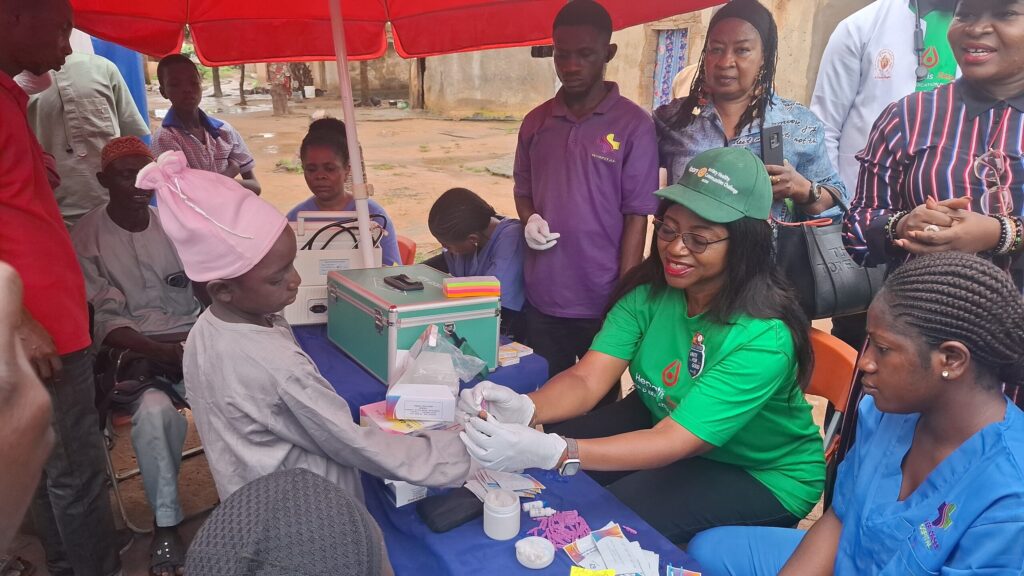From Fred Ezeh, Abuja
Lots of hepatitis B and C cases were detected in a small Abuja community by a team of doctors from the Rotary International District 9127, Abuja, to conduct some community sensitization on hepatitis and other medical conditions particularly some infectious diseases.
The sensitization, which was conducted at Ruga Fulani community adjacent Baze University, Abuja, was part of the event to mark the 2025 World Hepatitis Day with the theme “Let’s break it down”.
The District Governor, Rotary International District 9127, Dr. Joy Nky-Okoro said the community sensitization was designed to raise the awareness of the community members regarding the disease, leveraging the opportunity provided by World Hepatitis Day.
She said: “Every 28th July is World Hepatitis Day, and that is why we are here as Rotarians to meet one of our communities for some medical checkups. Hepatitis is curable, but you need knowledge about it. Hepatitis is devastating and very infectious. Sweat from a carrier can spread the disease to another person. So, with the seriousness the disease has, it is very important that everybody should be interested in being examined because of the devastating effect.
“We are Rotarians, and our job is within communities. The medical outreach is done simultaneously across the country. Other clubs have gone to their different adopted communities to do the same thing we are doing here. But we chose this community because it’s like our host community, hence the decision to reach out to them with the medical sensitization. Over 100 persons have been attended to within the first few hours.”
Dr. Patrick Eze, the District Chairman for Medical Missions, in his remarks, said, “Together with the Chair for Hepatitis, we are here to provide support to this community. The environment of the community speaks volumes of why this intervention was actually cited here.
“Hepatitis is an infectious disease. It’s 10 times more infectious than HIV. That’s why we want to be sure that this community is free from hepatitis. We are seeing some positive cases already. Thanks to the district, we are able to provide drugs and even do a liver scan for those who are positive.
“The end line of hepatitis B and C infection is liver cancer. So, we want to be sure that they don’t get to the end stage. We want to ensure that those who have hepatitis are tested, and those who have advanced disease are detected on time and referred appropriately. For the children, Nigeria has a very comprehensive national programme on immunization. It provides for hepatitis vaccination for babies from birth, 6 weeks, and 12 weeks, respectively.”
He further explained that Hepatitis B is a sexually transmitted viral infection, and It’s in the same family with HIV in terms of transmission. Hepatitis B also has the characteristic of being highly infectious such that someone can produce it in saliva, in sweat, and other secretory organs. Because of that, it is easily transmitted to other individuals, and its main domicile is the liver.
“And it can be in the liver for a very long time, sometimes throughout the life of an individual. And because hepatitis B is vaccine-prevented, we want to ensure that mothers who have it do not transmit it to the babies. Otherwise, the babies would be born with hepatitis B.
“If an adult gets hepatitis B at 40 or 50, he may not have liver cancer in his lifetime. But if a baby or a child has hepatitis B, the chances that the child will have liver cancer at 30 or 40 is very high. Because it usually takes two or three decades for you to have that transformation to a liver cancer.
“So that’s why we are here to ensure that those mothers who have hepatitis B have a different treatment. If they are pregnant, their babies should be given certain injections to prevent that transmission to the babies.”
The community leader, Umar Lawal, thanked Rotary International for the opportunity to improve the health of the people through health talks on hepatitis, screening, and drugs.


